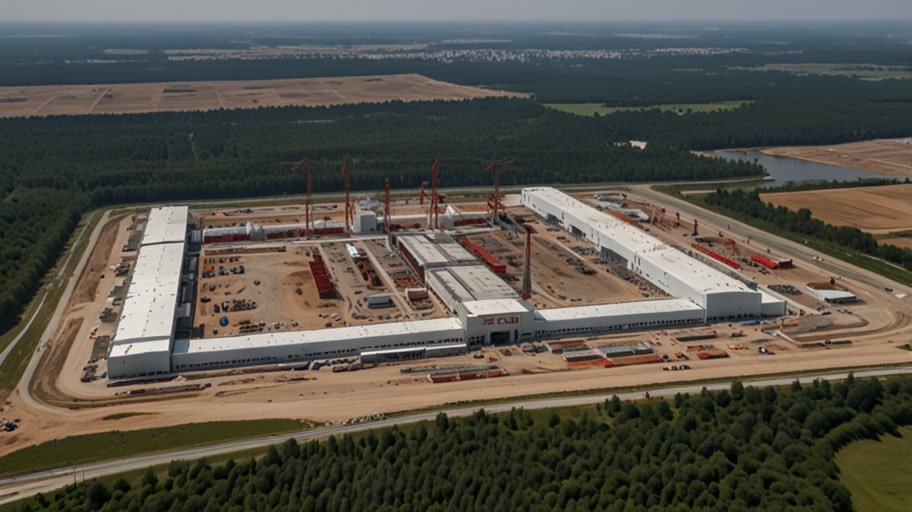On June 5, 2025, Tesla announced major issues in expanding its factory in Germany. Tesla’s goal to boost electric vehicle production in Europe was delayed due to problems with regulations and the environment, and the company’s shares went down about 5%.
Environmental Pushback Intensifies
Some environmental groups from the area have mentioned that the plant is risking valuable water sources and the environment. The authorities in Brandenburg have increased their checks and now require ecological standards to be met more strictly. Because of this, Tesla cannot reach its plan to double the factory’s output to make 1 million vehicles each year by 2027.
Regulatory Maze Slows Progress
The difficult permitting requirements in Germany have stood in the project’s way. Tesla’s expansion, which features new battery plants, still needs to clear several permission hurdles. CEO Elon Musk has become frustrated with the region’s regulators, stating that the laws are getting in the way of progress.
Supply Chain Strains Persist
Tesla’s business continues to suffer from frequent problems in the global supply chain. Due to the semiconductor shortage and increasing materials prices, production schedules have become restricted. With lower production, the Berlin plant is struggling to keep up with demand for the Model Y, which was the leading electric vehicle in Europe last year. Individuals’ Reactions Display Anxiety Early in the day, Tesla’s shares went down 5% because of investor concern about the delays. LONG-term setbacks, it is said, could reduce Tesla’s advantage in Europe since rivals are adjusting their production strategies and adding more electric vehicles with fewer regulations.
Strategic Pivot Under Consideration
To avoid construction delays, Tesla is studying other battery production areas and is looking for joint ventures in Eastern Europe. The firm wants to spread its manufacturing areas to lessen its dependence on Berlin. Still, Tesla may have to pay more and deal with more supply chain issues if it carries out such plans. There is Increased Competition More Chinese companies, such as BYD, are entering the European electric vehicle market. The company’s delays could result in rivals taking away market share since they offer more inexpensive products. CSL’s ability to manage regulations will be necessary to help it remain a top player in the area.
Workforce Challenges Add Complexity
Labor shortages at the Berlin Gigafactory have proved a challenge for Tesla as it finds it hard to hire skilled workers. Increased labor costs in Germany’s factories have caused expenses to rise and margins to fall. Tesla is turning to automation to deal with the struggle to find more workers.
Sustainability Goals Under Scrutiny
Some people are challenging Tesla’s environmentally friendly image since they point to the Berlin plant having a big impact on nature. While Tesla promises to bring in water recycling and tree planting initiatives, local activists still doubt them and ask for clear information and deadlines on their efforts to be harmful.
Economic Impacts on Brandenburg
Local businesses are experiencing delays because of the problems at the port. Earlier, Brandenburg officials were excited about the Tesla plant, but now they are required to balance what is economical with what is safe for nature. Even though the factory employed 12,000 workers, the stalled growth puts Tesla’s pledge to hire more workers at risk.
Musk’s Leadership in Focus
Both those who appreciate and those who criticize Elon Musk talk about his involvement in daily work. Even though Musk inspires Tesla’s progress, his comments against German authorities have created tension. The use of negotiation, they argue, may speed up the process and bring faith back to the interests of the locals. Technological Advancements as Support for Business The company is working harder on new technologies to avoid further delays. The company is working on testing advanced batteries to depend less on scarce resources. Such innovations may lower the costs and increase production efficiency, but getting them into place at Berlin remains a tough task.
Investor Confidence Wavers
The dip in Tesla’s stock price to 5% points to more concerns by investors in Tesla’s efforts in Europe. Although the company’s brand is well recognized worldwide, the events in Berlin reflect weaknesses in its plans to expand. Clear progress should be made on regulation and operations to gain back investors’ trust.
Customer Demand Remains Strong
In spite of these problems, many people in Europe are continuing to buy Tesla’s vehicles. The Model Y is still the leading seller, yet long waits to get the cars are annoying customers. Tesla offers free Supercharging to keep customers loyal, but its competitors are taking advantage of shortages in the market. The Road to Wellness Tesla is interacting with government officials and bringing in regulatory specialists to smooth the permitting process. The company is also working on using renewable energy to care for the environment. They are focused on setting up the Berlin project to restore it by mid-2026. An Important Stage for Tesla Important decisions are being made at Tesla’s Berlin Gigafactory. The company’s handling of regulatory difficulties, the environment, and supplies will determine its path in Europe. Tesla is focusing on making strategic changes and being sustainable, aiming to become the top company in electric vehicle sales.
